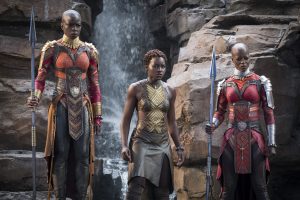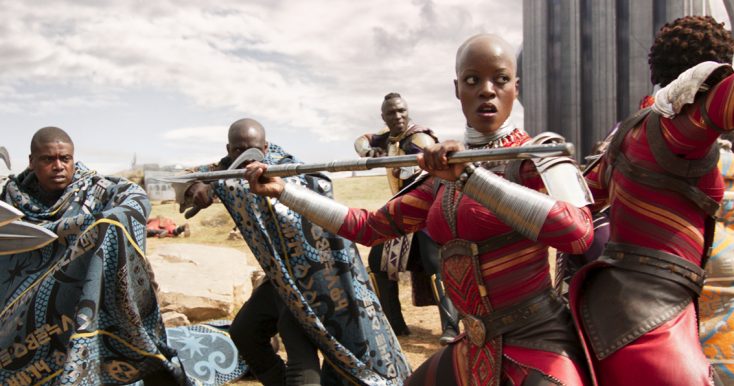
(l-r) Okoye (Danai Gurira), Nakia (Lupita Nyong’o) and Ayo (Florence Kasumba)..Photo: Matt Kennedy in Marvel Studios’ BLACK PANTHER..©Marvel Studios 2018
By ANGELA DAWSON
Front Row Features
HOLLYWOOD—While Marvel’s “Black Panther” superhero epic is being hailed as a historic achievement in popular cinema for bringing the first black superhero—the eponymous title character who also becomes the king of an under-the-radar highly advanced African country called Wakanda—to the big screen in the leading role of a big budget studio film, it also serves as an ode to female empowerment. The highly anticipated action-adventure film arriving in theaters Friday Feb. 16 boasts a host of memorable female characters who possess physical strength and mental acuity.
First, there is Nakia, a Wakandan spy who is highly disciplined, strong-willed, and can gives as good as she gets, especially when it comes to heir to the throne’s T’Challa (a.k.a. Black Panther played by “Get On Up’s” Chadwick Boseman), with whom she was once romantically involved. Her warrior skills match those of the Dora Milaje, Wakanda’s elite all-female security force, which makes her an exceptionally effective undercover operative.
Played by Oscar winner Lupita Nyong’o (“12 Years a Slave”), Nakia is conflicted over whether she should be guided by her duty to her nation or her lingering feelings for T’Challa.
Then there is Okoye, the able leader of the Dora Milaje, an all-female Wakandan Special Forces. She is the best fighter in Wakanda (with the possible exception of T’Challa) and she is unquestioningly loyal to the throne. Okoye is played by Danai Gurira, best known for playing sword-wielding hero Michonne on AMC’s “The Walking Dead.”
The brains behind Wakanda’s state-of-the-art weaponry is Shuri, T’Challa’s kid sister, a smart-mouthed, tech wizard. Second-in-line to the throne behind her brother, she is the smartest person in Wakanda as well as the top scientist and the innovator behind the Black Panther’s updated suits and technology. This brainy princess is played by British actress Letitia Wright, who starred on the 2016 sci-fi TV series “Humans.”
Finally, Ramonda is T’Challa and Shuri’s steadfast mother. Her goal is to help T’Challa become King of Wakanda in a peaceful transition of power, and to serve as the de facto advisor to the throne. However, as things get complicated for her son when outside forces plot to invade the country for its rare mineral resources, she sets aside her political functions and instead focuses on her role as a mother whose sole concern is the physical well-being of her children. Ramonda is played by Oscar nominee Angela Bassett (“What’s Love Got to Do With It”).
The maternal role comes naturally to this stalwart actress and real life mother of two. She unexpectedly found herself as the mother figure of the cast and embraced that with fulfilling results both onscreen and off.
During a press conference, “Black Panther’s” female actors each spoke about their role, the deeper meaning of the longrunning comic book series arriving on the big screen and working with Ryan Coogler, the promising young African-American filmmaker that brought project all together.
“I’d been waiting a long time for this,” says Nyong’o about seeing the film for the first time at the Los Angeles premiere. “I was just so, so, so excited, because this was a movie that we all felt a lot of ownership of, and that we thoroughly enjoyed making.”
“When you make a movie like this of this scale (with a projected $100 million budget), so much happens between the time you perform it and the time you see it with all the computer graphics stuff. Wakanda was built in in a room with Ryan and the incredible design team, and so to see it (onscreen), to see it almost like three dimensional was what I was looking forward to.”
Bassett was proud for her daughter and son to see the film at the premiere because
she could see their reactions on their faces that they were feeling the pride themselves.
Gurira recalls that when she first sat down with director Coogler, he spoke to her about his vision, the story, the characters and the women.
“I was just floored because you don’t actually get to hear that often,” she says, her hair still closely cropped with the symbol of the warriors shaved onto one side. “You don’t actually get sat down and hear that type of a vision. And then it embodied with us being on the (African) continent—women from the continent—but very developed, very complex. It was amazing. I just want to watch it (and yet) I get to be in it?”
Gurira, who was born and raised in Iowa but whose father immigrated from Zimbabwe, recalls that she was the first of the warrior actresses to have her head shaved for the role. She admits she initially had some trepidation.
“It sounded amazing,” she says, “and then the day came and it happened so I go into the restroom to wash my hands, and look up and go, ‘What the….’ It took a few days (to get used to). And then all the girls started coming in. We’d all been balded, one by one. It was just like everybody got their caps on. Then, the pride started to grow. There was this pride around it, and this sort of symbol of power in these women.”
The actress says one of her favorite moments in the movie is when her character grouses about having to wear a wig at in a scene set in a South Korean casino.
“She doesn’t want to cover up,” she notes. “This is her joy, her pride, walking in with that bald head with that tattoo on it. It was so subversive in the right way, to say you don’t have to have hair to be beautiful.”
Gurira was fascinated by the look of Wakanda that Coogler and production designer Hannah Beachler created based on concepts from five decades of Marvel’s Black Panther comic book history, which were created in 1966 by Stan Lee and Jack Kirby.
“What was really fascinating and almost very emotional for me being that I’m Zimbabwean (ancestry) and being that that’s something that you always kind of want,” she says. “You see the power and the potential of where you’re from, but you see how skewed it’s viewed by the world and how misrepresented it is and how distorted it is or received by the world so often.
“So, to see this world brought to life this way and to see all the potential and power of all of the different African culturalisms and aspects of our being that was celebrated is so different. It’s a birth of things that we’ve been seeing forever around the continent that we see when we’re there. We see beauty. We see power. We see potential. We see ability. We see resources, but they are never exhibited. To put it on sort of a Marvel epic scale of exhibition it’s like, it really salves wounds in a really deep way.”
“What I love about the way this film represents women is that each and every one of us is an individual—unique—and we all have our own sense of power and our own agency and we hold our own space without being pitted against each other,” says Nyong’o, who was born in Mexico to Kenyan parents. “I think that’s a very, very powerful message to send to children, both male and female this idea. Often times in movies, we fall into that trap where (female characters) are against each other.”
In “Black Panther,” she observes, “there’s a competitive spirit and stuff like that and this film freezes all that. We see women going about their business and supporting each other, even arguing with each other, having different points of view, but still not being against each other. That’s extremely important and in so doing the fact that in this film there’s so many of us, we really get a sense of the fabric of Wakanda as a nation and we see women alongside men and we see how much more effective a society can be if they allow women to explore their full potential.”
Director Coogler notes that women weren’t just onscreen, but many of the behind-the-scenes crew were female as well.
“This film has involvement from brilliant women all over from start to finish (including executive producer) Victoria Alonzo, who is amazing and she was there from, from day one and our crew was just, hired women who were the best person for the job. They weren’t hired because they were women but because they were the best for the job.
“Our cinematographer Rachel Morrison, our costume designer Ruth Carter, production designer Hannah Beachler and our assistant director Lisa Satriano, who was responsible for getting her team going. Post production the film was edited by Michael Shawver and Debbie Berman—who is from South Africa.
“I was incredibly blessed to have these people, to have their perspective and have their fingerprints all over it. When you saw all those frames, that presence, over half of the society, over half the population, it was there constantly and in full effect.”





